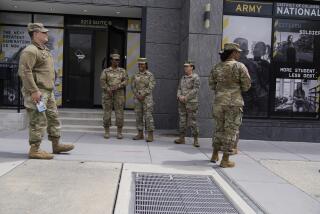Commander Says U.S. Likely to Shrink Its Numbers in Iraq
- Share via
BAGHDAD — With the death of militant leader Abu Musab Zarqawi, the U.S. will seek to press its advantage against Al Qaeda in Iraq, even as it probably will draw down American forces in the months to come, the top U.S. commander in Iraq said Sunday.
Gen. George W. Casey’s comments on Sunday news shows underscored tension in the military’s position. The U.S. suddenly finds itself with a chance to build on its blow against Al Qaeda in Iraq while taking advantage of the stability offered by Iraq’s new government to reduce the U.S. presence.
“As long as the Iraqi security forces continue to progress and as long as this national unity government continues to operate that way and move the country forward, I think we are going to be able to see
For months, the Pentagon has suggested that Casey would be in a position this spring to recommend further cuts in the U.S. troop size, reductions that began in December when deployment orders for two brigades were canceled. But the long wrangling over who would become Iraq’s prime minister and who would fill the posts of defense and interior minister, along with continued violence in Iraq, forced Casey and Pentagon officials to put off decisions about whether to hold back additional brigades.
With the top Iraqi jobs now filled, the White House will begin its long-awaited discussions on the way forward in Iraq at a meeting today of President Bush’s war Cabinet at Camp David. It’s very likely that this week’s meetings will include talk about the size of the American force. The U.S. has about 130,000 troops in Iraq, down from a peak of 160,000 in December.
The death of Zarqawi, the leader of Al Qaeda in Iraq, in an American airstrike Wednesday has put a wrinkle into the plans of U.S. commanders, who also see an opening to act on intelligence acquired in raids that followed the attack.
“We’re trying to take advantage of the opportunity that is presented here by leadership turbulence,” Casey said on CBS. “Any time you change a leader in an organization, it’s a period of turbulence. It’s especially critical in war.”
Al Qaeda in Iraq on Sunday announced that it was plotting more bloodshed. The insurgent organization’s governing council had met to discuss post-Zarqawi strategy, the group said in an Internet statement that added: “We plan large-scale operations that will shake the enemy and rob them of sleep.”
Asked about the threat, Casey said that in the past Al Qaeda tended to sharpen its rhetoric when it was “hurting.” Still, he said U.S. forces were taking such threats seriously.
Earlier on “Fox News Sunday,” Casey said there would be enhanced security operations in Baghdad and that the U.S. would also continue its offensive against Al Qaeda in Iraq.
“We have had a steady drumbeat of operations against the Al Qaeda network here in Iraq since the Zarqawi operation,” he said.
Pushing a major American offensive against Al Qaeda in Iraq and the broader insurgency would not necessarily require additional troops. But sharply reducing U.S. forces in the next few months would seem to preclude stepped-up operations.
Casey is due to participate in the Camp David talks by video linkup. He would not say Sunday what he would recommend to Bush. Still, when questioned by CBS’ Bob Schieffer about troop reductions, Casey said the U.S. presence probably would shrink.
Last month, the Pentagon announced it was putting off a decision about whether to deploy a brigade from the U.S. Army’s 1st Infantry Division from Germany to Iraq. In the next few months, it will face deadlines about whether to deploy other brigades from the 82nd Airborne Division, 25th Infantry Division and 10th Mountain Division. Army officials say the 3rd Brigade of the 2nd Infantry Division scheduled to deploy in August will not be delayed.
Decisions on those brigades probably won’t be made at the Camp David meeting. American officials must wait to see how Iraqi Prime Minister Nouri Maliki meets the security challenges his new government faces, which include tamping down violence by militias tied to the nation’s Shiite Muslim majority. Shiites dominate the government.
The most significant violence in Iraq on Sunday was between Shiite militiamen and British forces in the southern Iraqi city of Amarah, a fight that left at least five civilians dead.
Elsewhere in Iraq, at least 41 other people were killed in bombings and shootings. A roadside bomb targeting a bus carrying oil ministry workers killed six people and wounded 12 others in Baghdad today, a police source told Reuters news service. The bus was on its way to an oil refinery in the capital’s southern Dora district when the bomb detonated.
The fighting in Amarah began when British troops were hunting for militants suspected of firing homemade missiles at the British base.
As the British patrolled the streets, one of their vehicles got stuck in a sewer, a witness said. Shiite gunmen opened fire on the British, and civilians were killed in the crossfire, sources in Amarah said.
Tensions have been high between British troops and members of the Al Mahdi army, a Shiite militia loyal to anti-American cleric Muqtada Sadr.
*
Barnes reported from Washington and Stack from Baghdad. Times staff writers Caesar Ahmed, Saif Hameed and Raheem Salman in Baghdad contributed to this report.
More to Read
Sign up for Essential California
The most important California stories and recommendations in your inbox every morning.
You may occasionally receive promotional content from the Los Angeles Times.













